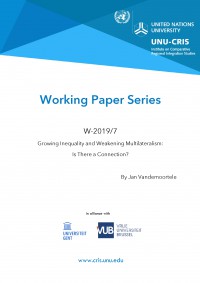Growing Inequality and Weakening Multilateralism: Is There a Connection?

The paper draws together the latest evidence from a wide range of disciplines to expose the harmful effects of inequality. At the individual level inequality harms human health, well-being, and behaviour. At the state and international levels it damages cooperation in politics and multilateralism. It is probably not a coincidence that multilateralism was stronger when inequality was considerably lower. The paper argues that high levels of bad inequality eventually leads to distorted and manipulated public discourse. At the same time, inequality creates a more resentful electorate that can be coaxed into casting protest votes. The combination of the two lead to electoral volatility, and the resulting elected leaders tend to be polarising, demagogic, and often imbued with a strong sense of nationalism. When stepping into the multilateral arena, they unfailingly take a my-country-first attitude, preferring confrontation over compromise. They readily point the finger at other states, accusing them of being lawbreakers and wrongdoers because they see them as unfair players, rather than as equal partners. This tendency is most evident in the growing frictions within the global trading system. Thus, the present-day crisis in multilateralism cannot be disassociated from growing inequality at the state level.
